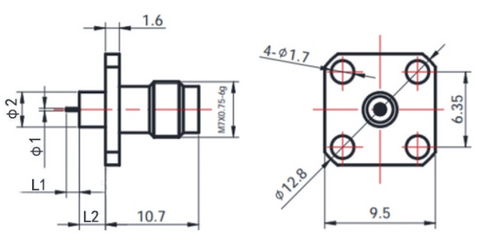2.4mm Female Connector with 4-hole Flange | Hole Spacing 6.35mm | Metal Through-plate | DC-50GHz
Gwave provide a group of 2.4mm Female Flange Mount and Metal through-plate connectors, using frequency up to 50GHz. This series of connectors have 4-Hole flange, flange size is 9.5mmX 9.5mm and the space of flange hole is 6.35mm . They have different Through-plate matel diameter and length, different tail Pin diameter and Length. Please refer to the picture, drawing and the corresponding size to select the product you need.


Part Number List:
| 2.4-KFD0201 | Φ1=0.3mm,Φ2=4mm, L1=1.5mm,L2=1.4mm |
| 2.4-KFD0202 | Φ1=0.3mm,Φ2=4mm, L1=1.5mm,L2=3mm |
Specifications:
| Frequency | DC-50GHz |
| Insertion Loss | ≤ 0.05 xSqt.(f_GHz) dB |
| VSWR | 1.15 |
| Body Material | Stainless Steel |
| Mount Method | 4-Hole Flange |
| Size | 9.5mmX 9.5mm |
| Operation Temp. | -55~+165deg. |
High-Precision 2.4mm Connectors from Gwave Technology Inc.
One of Gwave Technology Inc.'s top connectivity options is our 2.4mm connectors for high-frequency applications. These connections can handle frequencies up to 50 GHz, making them ideal for RF testing, aircraft, and telecommunications.
We make our 2.4mm connectors with accuracy and dependability to minimise signal loss and maximise performance. Due to their tiny size, they may be integrated into tight spaces while maintaining excellent electrical properties. Our 2.4mm connectors are durable and operate well in tough conditions due to their solid structure and high-quality components.
Our 2.4mm connectors provide reliable connections for modern communication systems and high-frequency investigations. Choose Gwave Technology Inc. for your high-frequency communication needs to experience our solutions' superior quality and reliability. Use our cutting-edge 2.4mm connections to enhance your systems and trust our experience to produce great results.
We Also Recommend
FAQs
What are the Applications of 2.4mm Connectors?

The 2.4mm connectors are hence utilized in high-frequency applications such as microwave communication, aerospace, and satellite systems. They ensure low signal loss and high precision for systems operating up to 50 GHz. These connectors are essential for those environments that require high-quality and reliable RF performance. Read More
What Materials are Used in 2.4mm Connectors?

These connectors are usually made of the best stainless steel or beryllium copper for their strength and conductivity; yet most often, gold plating is used for the best corrosion resistance and improved electrical performance to guarantee a trouble-free operation, especially in high-frequency demanding applications.
How to Identify a Faulty 2.4mm Connector?

A bad 2.4mm connector will have signals that are lost more, and the connection is unstable. With a visual check, one can trace the issue to the form of wear, misalignment, or corrosion. However, some problems need only to be identified by network analyzer performance testing. Faulty connectors should always be replaced so that your system is always at optimum performance.
What are the Benefits of Using 2.4mm Connectors?

The performance in high frequency is excellent with no signal loss and is very durable. Connection is stable in 50 GHz systems. It is ideal for the accurate measurement and high-integrity transmission of signals in high RF systems.
How do Maintain a 2.4mm Connector?

Cleaning dust and debris from surfaces hosting the connector is needed for a 2.4mm connector. Avoid over-tightening as it may cause wear when installing. With occasional inspection and proper care, its longevity could increase, hence optimal performance in high-frequency use.









